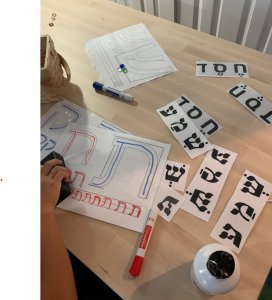
As we closed our learning about Rosh Hashanah last week, we began reflecting on ideas about Yom Kippur. Although September is full of short weeks, we are packing in all kinds of creative and engaging opportunities for joy and growth.
During these two weeks we have been discussing community, neighbors, how we treat one another, how we understand and rectify mistakes and what is important, and even holy to us
Every day I am seeing many examples of ואהבת לרעך כמוך loving your neighbor as yourself, a true embodiment of what we are learning about.
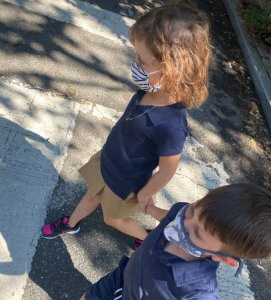
Students in Jewish Enrichment have been practicing Jewish Placemaking here at Makom South Philly. Since day one, we have started to dream about what we want Makom South Philly to be and how we can work together to make it just that way!
Some ideas we have come up with so far include:
- To make a volcano.
- To have a pizza party, challah party, Jewish party, and parties (of some sort) everyday.
- To have lots of arts and crafts, science projects, and science kits.
- To make landforms, collect sticks, leaves, rocks, and other natural items.
- To plant flowers and play with kid circuits.
- To plant fruit trees (if we have space).
- Banana, lemon, apple, avocado, rainbow fruit, star fruit.
- To go to a Phillies game, to make a pretend hot air balloon, to make a car.
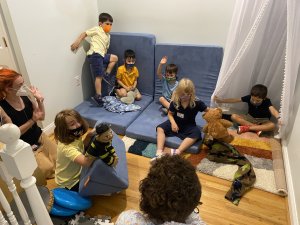
We have begun to observe new friendships emerge and watch students become more comfortable at Makom as they take ownership over the space. An ashrei (joyful) moment for me last week was watching students engage together in a self-directed project, making a collaborative Makom installation from colorful scarves and legos.
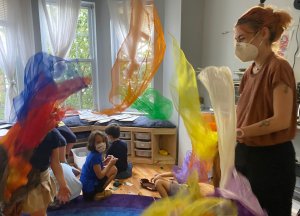
Student A: This is going to be a beautiful Makom.
Student B: This one is so pretty it almost looks like it has cheetahs on it!
Student A: It’s a Makom, a really beautiful one.
Student B: It almost looks like a savannah.
Student A: This is the Alef-Bet room, this is the rainbow room because it’s a rainbow.
Student B: This is Rabbinit Dasi’s apartment, it’s the upstairs part.
Student A: This is the African Savannah.
Another ashrei moment for me last week was observing an act of chesed (Kindness) from one of our students who gave up her challah to make a challah for the group after overhearing that we underestimated the amount of dough we would need for Family Shabbat Celebration. She didn’t hesitate to share to support her community.
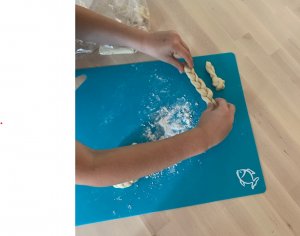
Hearing from students about what is important to them has been such a gift. When discussing holiness students had a lot to say!
What does holy mean?
- Its like the conversation we just had.
- It reminds me of when we say holy moly.
- I’ve heard before of Holy Water and The Legendary Holy Apple, I know its special and related to God.
- I recognize the world Holy and Israel from tefilah.
How do you know something is holy?
“When I’m watching tv it feels special and exciting and a little scary and I like scary.”
What is holy to us:
- School.
- My house (tv).
- TV.
- Wi-Fi.
- The Hospital.
- Sleeping.

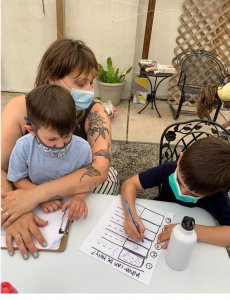
One more ashrei moment for me this week was observing one kiddo support her new friend by making a keychain for her after we realized that her keychain had fallen off her backpack. This kiddo was so thrilled to receive the keychain she made friendship bracelets as a thank you gift in return.
This week during snack time learning we discussed ways in which we can support one another and make Makom a place where all feel safe to learn and grow. Students shared ideas about how we can help each other regulate in order to treat our fellows with respect. We learned about grudges and spoke about ways we can avoid holding a grudge.
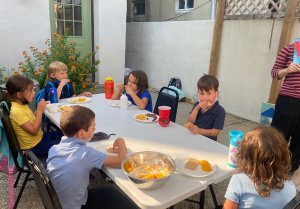
How do we want people to help us feel better?
- I feel it in my brain.
- When I’m nervous it feels like I have 1000 Gideons in my belly.
- Ask me if I am okay.
- Ask me what happened.
- I want space and to be left alone.
- Check if I am okay and do something I like with me.
- Get me a real cheetah. (Something I like)
- Give me space and time to calm down.
- Let me go to the Pinat Shalom.
These are some ways I have observed learners actively self-regulating this week:
- Taking a break from a tough conversation by giving each other some space.
- Reading a book.
- Coloring.
- Taking a deep breath.
- Coming to a compromise by taking turns.
- Asking for something they need (a lap, more food, a break, a hug).
- Choosing another activity that suits their current needs.
- Using their words to express frustration and naming their feelings.
- Sitting in a meditation position.
Students have started the process of co-creating a peace walk, this is a tool that we will use in the classroom to help resolve conflicts and help ourselves and each other feel regulated.
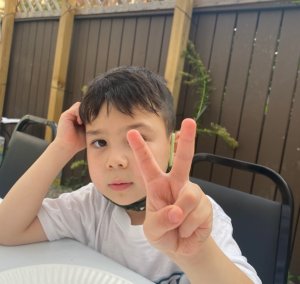
These are the steps that students have come up with:
- Say truce.
- Take some time to calm down, talk to your body and brain about how to calm down, notice the feelings and sensations.
- Take a deep breath.
- Go to the Pinat Shalom.
- Take turns saying how you feel and what you didn’t like.
- Problem solve.
- Take turns saying what you want / need.
- Say sorry or if you are not ready to say sorry.
- Make a peace sign or bump elbows.
I look forward to many more weeks of beautiful conversations! Next week, we’ll be exploring the practice of loving our neighbors and thinking about how that shapes our relationships with ourselves, each other, and our world.
